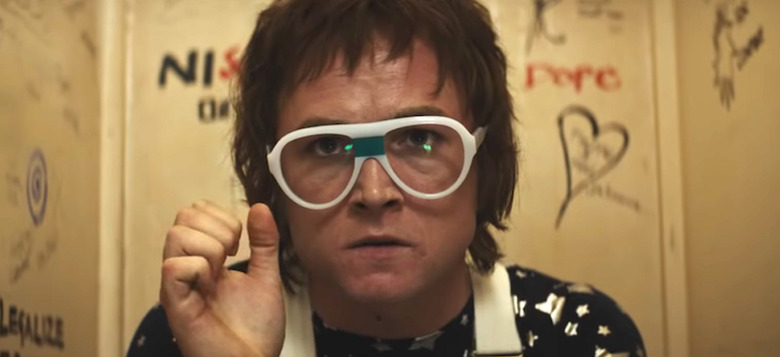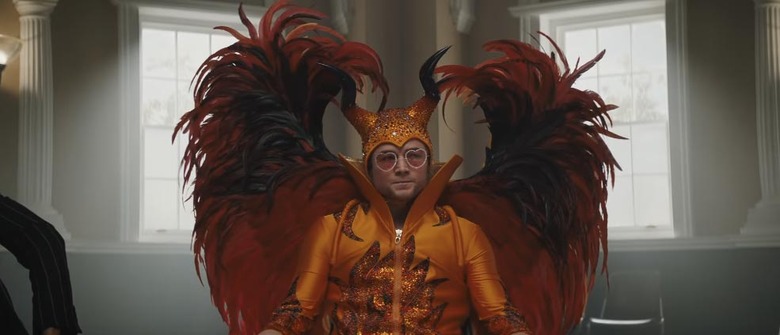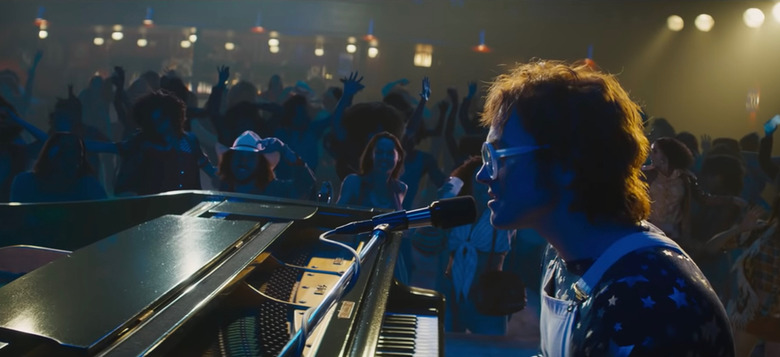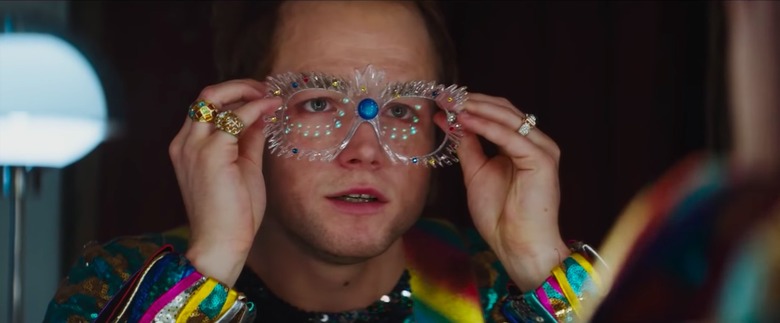'Rocketman' Spoiler Review: A Standard Biopic That Works Best When It Lets Its Freak Flag Fly
In a perverse way, it makes sense that there are two films fighting for dominance in the middle of the musical biopic Rocketman. This story of the life and times of Elton John, sanctioned by the man himself, is unable to figure out whether it's either a straightforward biopic in the vein of films like Walk the Line and Ray, or if it's going to be a fantastical take on the English rocker's songs, the same way that Julie Taymor's Across the Universe re-contextualized the music of The Beatles. When Rocketman works — and it does work well enough that it deserves a mild recommendation — it's because it leans far away from standard-issue storytelling. Like the performer, Rocketman is best when it lets its freak flag fly.
A Long, Long Time
Taron Egerton steps into the platform shoes and oversized glasses to play the awkward, self-proclaimed fat kid from England named Reginald Dwight who would grow into musical superstar Elton Hercules John. The film's framing device sets up the duality at play, both within Elton John as a person and within Rocketman itself. Elton bursts through a set of double doors, dressed to the flamboyant nines with a bright orange, glittery costume...into an AA meeting where he proceeds to tell his life story to a muted group of fellow alcoholics. As Elton begins, he sees his younger self, who begins belting out "The Bitch is Back" before the scene transitions back to England of the 1950s.During the musical numbers themselves, director Dexter Fletcher and writer Lee Hall are able to balance the film's two aims: telling us about the life of Elton John while visualizing his work in a way that's so fanciful and outlandish that no one would mistake it for a hard-nosed case of cinematic biography. "The Bitch is Back" is full of dancing, singing, and a deliberate choice to balance the monochromatic colors of old-school England with Elton John's more colorful costuming. Soon after, there's a rousing rendition of "Saturday Night's Alright for Fighting" in which the film fully transitions from following a young version of Elton/Reginald to the Egerton-portrayed version who became an indefatigable rock star.Honestly, if Rocketman fully leaned into this goofy, largely nonsensical, but emotionally thrilling style for its entirety, it would be warped and wonderful. The parts of Rocketman that are most enjoyable are all about the performance of Elton John's music. They remind you, first and foremost, that John and his lyricist Bernie Taupin (portrayed here by Jamie Bell) wrote some extraordinary pieces of music that deservedly have stood the test of time. But Egerton and the rest of the cast are also gifted enough singers that there's never a sense of Rocketman profaning John's legacy.That, of course, is because John himself was heavily involved in the development and production of this film. His presence explains why Egerton was cast, as much as the young actor's talent does. A few years ago, the young star of the Kingsman films appeared in the Illumination Entertainment animated film Sing, where he got to perform "I'm Still Standing" and prove his unexpected chops at offering a familiar-yet-just-different-enough take on the rocker's music. But Egerton's casting, and John's approval of it, doesn't explain how inexplicably dull the stretches in between musical numbers are.
This is Your Song
From the moment when we see him as a child, Elton John's major emotional traumas can be placed upon his parents. There's his blowsy mother Sheila (Bryce Dallas Howard, doing her best English accent, which is not saying much), who supports her son's musical gifts to a point, but doesn't seem to know how to love him. And there's his gruff, militaristic father (Steven Mackintosh), who adores jazz but loathes his family and soon leaves them behind. When, later in the film, Elton comes out to his mother over the phone, she drily informs him that she already figured he was gay and that his identity means no one will ever love him properly.It's worth noting here that the issue is not whether or not this conversation ever happened. The emotional truth of this moment is meant to be gutting — as cruel as Sheila's comment is to Elton, and as much as he may want to tell her she's wrong, he clearly takes it to heart for the rest of the film. The problem isn't whether this conversation is true, but whether it's dramatically interesting. Even though Elton's self-loathing and self-doubt are a recurrent issue throughout Rocketman, it's rarely ever brought to life in a way that's remotely as compelling as the songs are.The same is true of two major relationships Elton has with men in his life. One of the film's emotional throughlines is between Elton and Bernie, the two of whom instantly bond over their love of country/Western music after the former is given the latter's lyrics. In a good number of ways, Rocketman's core romantic relationship is entirely platonic, because it's the one between these men. Their core falling-out, due to Elton's growing reliance on drugs of all kinds, allows the film to be both dramatic and musical, as we get muted takes on songs like "Goodbye Yellow Brick Road" and "Sorry Seems to Be The Hardest Word". By the end of the film, they've unsurprisingly reunited as happily as possible. That said, the closing-credits captions undercut this relationship, as we learn that Elton John met his current partner, David Furnish, in the early 1990s and was "loved properly". (The italics, to note, are directly from the film.)
Someone Saved My Life Tonight
A key ingredient of why Elton and Bernie separate, at least within the film, is because the latter is lured away by pretty women while Elton meets the other major male figure in his life: music manager John Reid (Richard Madden). Reid is attractive and well-dressed, and immediately appeals to Elton. They quickly fall into bed together, before Reid overtakes Elton's professional life. This, even as it's clear that Reid is something of a Mephistophelean character, leaning more on making Elton popular even if it's bad for his mental state of being.Much has been made of the coupling between the two men, though it ought to be acknowledged that this is a fairly chaste depiction of a homosexual relationship, especially in a film that's made hay out of the fact that it's R, not PG-13. (A bit of context: I saw Rocketman the night after seeing the new horror film Ma. Spoiler alert: there is more male frontal nudity in Ma than in Rocketman.) The entirety of Elton's romantic relationships, too, seem to last literally as much time as any one of his songs. The Reid/John relationship is dramatized well during a performance of "Honky Cat". However, we later see Elton connect with a female sound engineer upon seeing her; they are then instantly married, and within maybe three minutes, they're already divorced.It's here that I should note one of the unfortunate problems with balancing crazy musical numbers and a too sober-minded depiction of Elton John's life. You don't have to look hard to learn about some of the facts of his life, and how much they go against what's displayed on screen. To wit: John's marriage to that sound engineer, Renate Blauel, is real — and it lasted three years. Perhaps more importantly, it took place between 1984 and 1987. (Keep those dates in mind.) It's also odd that the film presents how Elton came upon his stage name in part because of seeing a photo of John Lennon, when the legend suggests that he did it in honor of his friend and collaborator Long John Baldry, referenced in the great "Someone Saved My Life Tonight". (Notably, Baldry and that song do not appear in Rocketman.)As mentioned above, the framing device of Elton John at an AA meeting eventually is made clear: he checks himself into a facility right before going onstage at Madison Square Garden. He stays at the facility for an indeterminate period of time; while there, he's visited by Bernie where they reconcile, and the lyricist shares some new song ideas with our hero. One of those songs is the aforementioned "I'm Still Standing", which Elton begins performing first to the camera before Fletcher transitions from the rehab facility to a recreation of the song's music video for the last moments of the film. "I'm Still Standing", to note, was released...in 1983. It's even more baffling when the closing-credits captions begin and one notes that Elton has been sober for 28 years and counting, which would suggest he only became sober in 1991. And seeing as John checked into rehab for the first time...in 1990, that tracks. It just doesn't track with the film trying to have its cake and eat it too, being both a flamboyant fiction and a clear-eyed take on a musical legend.
A Dark Period
Timeline issues aside, the problem is simple: when the characters in this movie aren't singing, Rocketman feels less like a wild and crazy fantasia of music and excess, and more like the same boring biopics that were parodied over a decade ago in Walk Hard: The Dewey Cox Story. No joke: there's one specific montage in which we see Elton going through coke and prescription pills like they're candy, and he might as well look at the camera and shout out, "This is a dark fucking period!" Almost as bad is a montage near the end of the film where Elton mentally runs through the times people have hurt him verbally, as we get brief flashbacks to moments in the film that only occurred roughly ten minutes ago.Criticisms aside, Egerton is an excellent casting choice as Elton John (in earlier iterations of the biopic, the singer would have been played by Justin Timberlake or Tom Hardy). His voice isn't quite the same as John's, but it's familiar and full enough that he always sounds just right in his inflections. His ability to take one of John's songs and turn it into something equally as passionate, while not feeling like a karaoke cover, is the best part of Rocketman. Every time the music kicks in, and director Dexter Fletcher (fresh off of kinda/sorta directing Bohemian Rhapsody, no matter what the director credit says) gets to spin his camera around with dizzying speed, this movie is ridiculously wonderful to behold.One of the common threads in Rocketman is Elton's utmost need to embrace his true identity. It seems hard to imagine that someone as prone to wearing colorful costumes wouldn't have already done that, but the film makes clear that Elton John's public-facing persona was a mask for the real person. That's all well and good, but Rocketman is never quite as interesting when exploring the man behind the music as it is when it just dives right into the rock.




